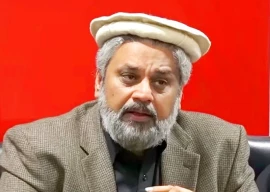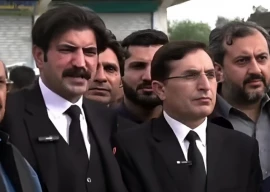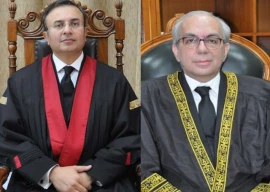
The office of ECP secretary had fallen vacant after the resignation of Ishtiaq Ahmed Khan in March, whereas the chief election commissioner had retired the same month.
Akhtar Hussain Sabir, an additional secretary, was given charge as acting secretary ECP to run the affairs of the commission. Sabir attained 60 years of age on Monday, and if not given extension, he stood retired now, sources in the ECP said.
After the “retirement” of Justice (retd) Hamid Ali Mirza due to the growing differences between the government and the opposition, this key office is unlikely to be filled immediately.
Since the office of the Chief Election Commissioner (CEC) is a constitutional post and cannot remain vacant, Justice Shakirullah Jan, a judge of the supreme court, is officiating as acting CEC till the appointment of a permanent CEC.
Unlike the appointment of CEC which has to be made through a parliamentary panel, the appointment of ECP secretary is prime minister’s prerogative. After conviction of the prime minister last week, another legal controversy might be generated in case he fills the office of ECP secretary. The ECP secretary has a crucial role in running the affairs of the commission.
Since ECP secretary is a grade 22 officer, an official in the same grade working in any other department can be transferred to the commission or the government can promote an official working in grade 21 to this post. This would have been a simple procedure for the prime minister before his conviction but now can generate another controversy creating more problems for the beleaguered government if the opposition or a citizen challenges the validity of any such appointment made by Gilani.
Aside from legal experts’ differences over the start of implementation time on the supreme court verdict in the contempt case against Prime Minister Yousaf Raza Gilani, the Election Commission, which would have the final say in making the decision to unseat the premier, is clear that countdown would begin once the detailed judgment is announced.
Some legal experts believe that countdown has started on the day the short order was issued on April 26, but others say it will start after the announcement of the detailed judgment.
However, the Election Commission, which comprises four retired judges of high courts, one each from all the four provinces and a sitting supreme court judge, the latter is heading the commission as the acting chief election commissioner, at a meeting on Monday came to the conclusion that the countdown will begin from the day the detailed judgment will be issued by the supreme court, sources privy to the development said.
“The commission has decided to wait for the detailed judgment to see what directions the court gives to the ECP. If there will be no clear-cut direction, the commission is likely to approach the supreme court for further orders,” an official of the ECP told The Express Tribune.
The supreme court has already sent its short order to the Election Commission through official channels. It has also sent a summary to the National Assembly speaker with directions to proceed further. A legal debate is, however, going on implications of the short order since many legal experts believe that it does not contain any clear-cut directions how to proceed further.
Under Article 63-2 of the Constitution, once a reference to unseat a member of the National Assembly is sent to the NA speaker and if she does not take action within 30 days, the reference is deemed to have been forwarded to the Election Commission. The commission has 90 days to decide the fate of such a reference.
After the 18th Amendment to the Constitution, all the four members and the chief election commissioner have equal powers to take decisions on legal matters.
Published in The Express Tribune, May 2nd, 2012.
COMMENTS (1)
Comments are moderated and generally will be posted if they are on-topic and not abusive.
For more information, please see our Comments FAQ
1725947389-0/Selena-Gomez-(1)1725947389-0-405x300.webp)


1725936122-0/Untitled-design-(14)1725936122-0-165x106.webp)









1725859023-0/Untitled-design-(38)1725859023-0-270x192.webp)
1725879396-0/Untitled-design-(27)1725879396-0-270x192.webp)








The fame-hungry head should return home to dictate the text to his colleagues and bring an end to the agony of suspense.